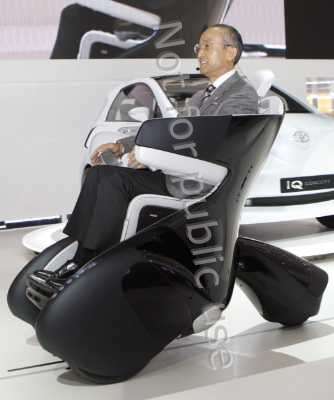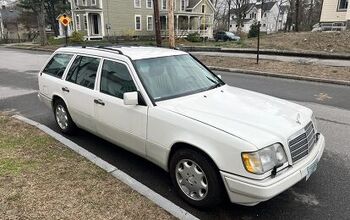Toyota Profits Plummet 73.6%
Automotive News [sub] reports that Toyota’s profits took a dive in Q3, as sales in its North American and European markets dried-up and blew away. “North America slumped to a $335.9 million operating loss in the April-September fiscal first half. Sales there slid 9.4 percent to 1.357 million vehicles in the period. For the full year, Toyota lowered its ambitions 2.420 million units, an 18.2 percent fall off.” Bottom line? “Toyota now expects global operating profit to plummet 73.6 percent to 600.0 billion yen ($5.83 billion) in the fiscal year ending March 31, 2008. Just three months ago, Toyota had forecast operating profit to decline a comparatively modest 29.5 percent to $15.5 billion. The new goal would be Toyota’s lowest operating profit since the company began calculating in U.S. accounting standards in 1998.” But it is, let’s face it, a profit. If GM and Ford report similar revenue drops tomorrow– and why wouldn’t they be worse?– excrement and air movement device will collide. (As everyone and their mother are predicting.) Meanwhile, back to Toyota…
“This is an unprecedented situation,” Executive Vice President Mitsuo Kinoshita said whilst delivering the results. “Every week, the environment gets worse.” Kinoshita reckons the global car market– and thus Toyota’s profits– won’t rebound until late 2009. “At the earliest.” Needless to say, it’s all hands on deck at ToMoCo. “Watanabe is now chairing an ‘Emergency Profit Improvement Committee’ [EPIC?] charged with staunching the bleeding and making sure Toyota stays in the black for 2009 and 2010. Details are scant, but the committee will review everything from pricing to product pipeline.” I wonder if they run a fleet of Gulfstreams or pay their CEO $15.5m a year? No, didn’t think so…
More by Robert Farago
Latest Car Reviews
Read moreLatest Product Reviews
Read moreRecent Comments
- THX1136 What happened to the other companies that were going to build charging stations? Maybe I'm not remembering clearly OR maybe the money the government gave them hasn't been applied to building some at this point. Sincere question/no snark.
- VoGhost ChatGPT, Review the following article from Automotive News: and create an 800 word essay summarizing the content. Then re-write the essay from the perspective of an ExxonMobil public relations executive looking to encourage the use of petroleum. Ensure the essay has biases that reinforce the views of my audience of elderly white Trump-loving Americans with minimal education. Then write a headline for the essay that will anger this audience and encourage them to read the article and add their own thoughts in the comments. Then use the publish routine to publish the essay under “news blog” using Matt Posky listing the author to completely subvert the purpose of The Truth About Cars.
- VoGhost Your source is a Posky editorial? Yikes.
- Fed65767768 Nice find. Had one in the early-80s; loved it but rust got to it big time.Still can't wrap my head around $22.5K for this with 106,000 km and sundry issues.Reluctant (but easy) CP.
- El scotto err not be an EV but to own an EV; too much training this week along the likes of what kind of tree would be if you were a tree? Sorry. Bring back the edit function.


































Comments
Join the conversation
@Landcrusher: As much as I love you, one item cannot remain uncorrected. In a true depression, money in the bank, under the mattress, a cold cash kitty [s] will be [/s] is everything but worthless. A depression is when prices of stuff down and cash is king. Money becomes worthless when the government starts printing monopoly money to fund economic stimuli. THEN, the smart buy real estate.
Bertel, Sorry for the misunderstanding, I wasn't talking about a depression when I said "the big one". When I start talking about beans and ammo, I am talking about a collapse where paper money and rule of law have gone out the window. I use that to point out that there ARE best choices to make economically no matter what. Flight instructors use the expression, "Keep flying the plane," to impress upon pilots the need to never give up. You keep making rational decisions and doing your best. Failure to do so can turn an 80% chance for survival into certain death. Fear is the thing you can't give in to. It's the same thing with money. You keep making the best money decisions as long as you can. If you get a feeling of futility, you "invest" in a supply of beans and bullets and then get back to maximizing your wealth. If we give up, the politicians will be happy to take over our wealth. Fear is the thing you can't give in to.